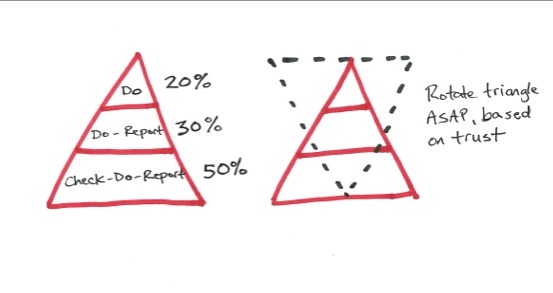Dealing With Admin vs Ministry Tension
Most ministers struggle with the day-to-day tension between administrative duties and pastoral duties. It sometimes feels like a competition: business versus ministry.
Can the two co-exist?
Some church staff roles are primarily operational, and some are primarily pastoral. But usually, whether it’s implied in your title or not, most roles are a combination of the two.
This is especially true for churches with smaller staffs. But whether your church has one staff-member or hundreds, most ministers face this tension everyday.
Meeting organizer or ministry in a home?
Controller of finances or stewardship teacher?
Staff manager or staff mentor?
Funding work or funeral work?
Preaching preparation or policy preparation?
The tension’s impact is highly visible on the resource of time. And in church ministry, it’s usually the “tyranny of the urgent” that wins out.
There’s also tension placed on a minister’s calling. Like many who lead staff, many of my role responsibilities are executive in nature (strategic direction, implementation, managing budgets, and staff). But God didn’t call me to be just an executive – He called me to participate in shepherding His church.
Do I use my spiritual gifts and executive experience to accomplish work for the church? Yes. But for me to be fulfilled in my Gospel Ministry calling, I must be able to connect performance reviews, rainy day funds, and information technology to people pursuing Christ. I need to perceive a clear connection between my executive work and the church working as God designed it.
If all my work is in the admin sector, then my work can seem meaningless, and unappreciated. If I’m all pastoral, well, usually the train begins to leave the track and it impedes ministry for me and even the church.
Does this resonate with you? If, like me, you need some help balancing these two elements of your role, here are a few techniques:
- Know and be comfortable with your role’s ebb and flow. There are seasons when one role may be dominant – and that’s okay.
- Be involved in hands-on ministry. Without it you lose touch, and your ministry becomes all head and no heart.
- Do an exercise with your team where you try to connect administrative duties you’re all engaged in to life-change outcomes. Can you connect the dots?
- Do some pastoral care, regularly – even if it’s not in your job description.
- Embrace those around you who are better at balancing these roles. See what they can teach you about working efficiently in each role, without losing balance.
- Be intentional in looking for and listening to stories of life-change.
- Even if it’s not you on the front-line, celebrate when work you’ve contributed to has an ultimate impact for Jesus.
- Plan for both ministry and administration in each day. A consistent disregard for administration for the sake of sermon preparation can have negative impacts. And a disregard for administrative tasks can really get in the way of sustainable ministry work.
All ministry matters, even it’s budget planning. You are a resource to the church and you need to allocate your time effectively so the church can be all that God called it to be.



 For several years, I had the opportunity to chaperone the annual Special Olympics dance at the Summer Games. It was greatness. Thousands of Special Olympian athletes on a football field, loud music, unfettered dancing, and fun.
For several years, I had the opportunity to chaperone the annual Special Olympics dance at the Summer Games. It was greatness. Thousands of Special Olympian athletes on a football field, loud music, unfettered dancing, and fun.